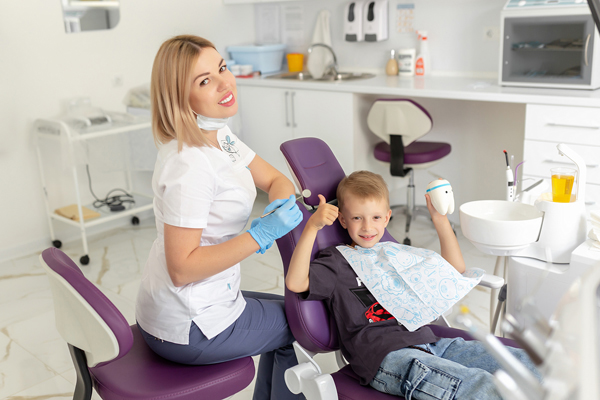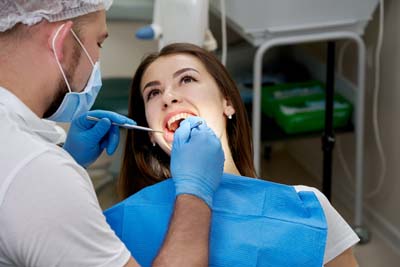Routine Dental CareWatertown, MA
At Pediatric Dental Arts, we practice routine dental care in addition to performing restorations and addressing any other complex dental issues that your child may have. In our Watertown dental office, we have found that by taking care of your child's teeth and planning for routine visits, we can prevent many common health problems like cavities, tooth infections and gum disease. If you want to keep your child's teeth intact, it is critical that he or she continues to receive routine dental care. As a pediatric dentist, we know the importance of proper dental care from a young age into adulthood. Your child only has one set of permanent teeth and we recommend that you do what you can to take care of them now. If your child has not visited the dentist in a while, we invite you to call 617-924-1911 and schedule an appointment for a dental exam.
How often should my child visit the dentist?
Many of our patients ask how frequently their child should visit our office for routine dental care. This is an understandable question since most people associate going to the dentist with visits to stop discomfort or a perceived health issue. Visiting the dentist is a little different. We want to see your child when he or she is not experiencing any problems to help keep it that way. Typically, when plaque and bacteria form on the teeth, your child will not see an immediate problem. When the plaque and bacteria are left on the teeth, your child can develop cavities and gum disease. Even small cavities will not always cause immediate discomfort, making it difficult to judge the condition of your child's mouth at home. This is why you should visit our office twice a year. We can examine your child's teeth, identify issues while they are small and treat them immediately. Our team will also clean your child's teeth in the same visit to prevent gum disease and infections. If your child is a diabetic, you may need to visit our office three or four times per year, depending on how often he or she has a diabetic episode. This is because uncontrolled blood sugar inhibits the white blood cells' ability to fight off infection, including the bacteria in your child's mouth. At Pediatric Dental Arts, we treat diabetic patients and can coordinate your child's care with his or her medical physician as necessary. If your child is healthy and not in any discomfort, we still recommend a dental exam and teeth cleaning at least once per year.
Does everyone need to visit the dentist?
Yes. At Pediatric Dental Arts, we recommend that everyone visit the dentist at least once per year, regardless of age. Even toddlers need to see the dentist. This is because everyone is susceptible to getting cavities and gum disease. For example, baby bottle tooth decay can impact two-year-olds that are prone to taking a bottle or juice to bed. Simultaneously, even seniors that have experienced full tooth loss need to visit the dentist to ensure that there are no issues with their gums and that their dentures still fit properly. Tooth loss leads to resorption in which the jawbone will change, leading to ill-fitting and uncomfortable dentures. With that in mind, regardless of how old you are or what your situation is – you should visit the dentist for routine dental care.
What procedures should I schedule as part of my child’s routine dental care?
When you visit our Watertown, MA office for routine dental care, we will do several things. First, we will examine your child's teeth with a visual inspection. We will look at every single tooth to determine if your child has any tooth decay. We will also look at your child's gums to see if there are signs of gum disease and take images of the mouth to see if there are any infections not visible to the naked eye. If we identify anything, we will discuss a treatment plan with you. Otherwise, we will proceed with cleaning your child's teeth and gums. Depending on your child's age, we will also recommend specific procedures that can prevent future cavities. For example, we often recommend fluoride as part of routine dental care. Fluoride is a mineral that, when placed on the teeth can strengthen them and reduce the risk of getting cavities by 30 percent. If your child tends to get cavities or live in an area of Watertown that does not have city water, this simple procedure can help your child to stay healthy. As a bonus, getting a fluoride treatment is painless and fast.
In children, we often recommend dental sealant as well. A dental sealant can be placed onto teeth with deep ridges and work as a barrier, preventing plaque and bacteria from becoming trapped and causing cavities. Tooth sensitivity can also occur due to a loss of enamel. This leaves the dentin underneath exposed and susceptible to irritation when your child eats or drinks. Fortunately, we can perform a bonding procedure to protect the dentin in your child's teeth. In order to do so, we will apply a tooth-colored material to the surface of the teeth, shape it and harden it using a special light. Once done, your child will have a natural-looking outer layer that replaces the lost enamel and reduces any sensitivity he or she might be feeling. This is one procedure that can be easily performed during routine dental care and will often prevent the need for crowns in the future. To learn more about bonding, we invite you to call (617) 924-1911 and schedule an appointment with our Watertown dental office.
Check out what others are saying about our dental services on Yelp: Routine Dental Care Watertown
What steps should my child take at home?
Routine dental care must also include good oral hygiene at home. At Pediatric Dental Arts, we recommend that your child brush his or her teeth with a soft toothbrush for two minutes at a time, twice per day. You should purchase a new toothbrush for your child every three months, have your child brush with fluoride toothpaste, and have your child make circular motions during the brushing. Follow this up with flossing once a day, drinking water and avoiding foods that are high in sugar. This will help your child's teeth to remain strong and healthy in between dental visits.
Back to top of Routine Dental Care



![How To Prepare Your Child For A Kid&# ;s Dental Checkup [Pediatric Dentist Visit]](/wp-content/uploads/kids-dentist-gppd-1909.jpg)
